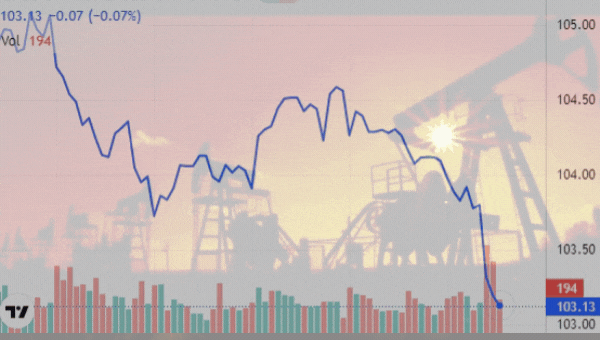President Biden's much-trumpeted release of SPRs, strategic petroleum reserves, neither brought down the rising oil prices nor forced the Middle Eastern producers to pump more out in order to relieve the pressure on tight global crude markets.
On the contrary, the price of crude oil kept rising up until today, until both the API, American Petroleum Institute and EIA, US Energy Information Administration, confirmed a crude build during the past week.
On Monday and Tuesday, the motorists - and manufacturers - clearly felt the pinch at pump with rising oil prices.
As of 15:45 GMT, the price of WTI and Brent stood at $104.00 and $106.00 respectively.
The cumulative release of crude stocks for a period of six months, analysts estimate, is just 5% of daily usage of crude oil in the US; a US Senator from the Republican Party has already branded the move as a drop in the bucket.
The US energy policy in the current form is not a model solution to look at: on one hand, the administration still wants to be seen as being hell-bent on reaching its Net-Zero goals; on the other hand, they want those who receive licences for new drilling to expedite their moves and pump more oil into the markets.
Walking the tight rope of energy crisis with the pole of 'going Green' is a risk and political and economic ramifications can be disastrous in the long run.
source: tradingeconomics.com
With the revival of the JCPOA, 2015 Iranian nuclear deal, meanwhile, being more or less stalled and the OPEC+ refusing to increase the output, the US government - and their allies as well - are running out of options.
The combined impact of the demand-supply factor on the crude oil markets is explicitly reflected by the rising oil prices; the rise in LNG price does not help in keeping the former at a sustainable level.
The rising price of crude oil has led to yet another crude oil build, according to the latest data from API - American Petroleum Institute.
Having fallen during two successive weeks, the US crude stocks have risen by 1.08 million barrels, according to the API; clearly the higher crude oil prices have compelled to consumers to use less.
With no end in sight for the conflict in Ukraine, the energy markets are going to be even tighter in the coming weeks, as more Europeans
join to 'punish' Russia for the atrocities they are allegedly committed, near Kiev, the Ukrainian capital.
All in all, no politician, in the East, West or Middle East, can come up with a solution to deal with the problem of rising crude oil prices - apart from offering round pegs to square holes.







